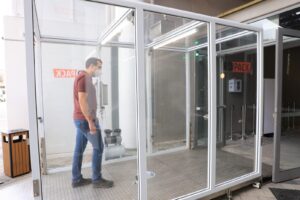Bar-Ilan researchers have developed a technology for the production of a powerful, environmentally-friendly disinfectant that can eliminate and kill viruses and has been proven effective in neutralizing corona-type viruses. RD Pack, an Israeli company based in Karmiel, has incorporated the disinfectant solution in a sanitary tunnel it developed to promote hygiene and safer entrance to public venues. Over the next month Sport Palaces of Tel Aviv Yafo Ltd. will run a pilot program with the sanitary tunnel placed at the entrance to Bloomfield Stadium.
Researchers from Bar-Ilan University have developed new methodologies to produce powerful, environmentally-friendly disinfectants, based on tap water, that can eliminate bacteria and kill viruses, including microbes from the coronavirus family. The ability to turn ordinary tap water into virus-fighting materials was developed and patented by Dr. Eran Avraham, Dr. Izaak Cohen, and Prof. Doron Aurbach, who leads the electrochemistry group in the Department of Chemistry and Institute of Nanotechnology and Advanced Materials at Bar-Ilan University. The materials were recently tested by Dr. Inna Kalt and Dr.Tatiana Borodiansky Shteinberg in the lab of Prof. Ronit Sarid, of the Mina and Everard Goodman Faculty of Life Sciences at the University, and proven effective in neutralizing corona-type viruses.
The disinfectant may safely be used on surfaces in hospitals, supermarkets, office buildings, airports, hotels, trains, buses, schools and kindergartens and other venues on a daily basis as a substitute for other commonly-used toxic chemical disinfectants.
The Israeli company RD Tech acquired the technology from Bar-Ilan University and has incorporated the disinfectant solution in a sanitary tunnel it developed to promote hygiene and safer entry to public venues. The tunnel provides disinfection via an integrated system that sprays the solution to provide maximum protection against bacteria and viruses for all those who pass through it. A water pump machine on the sides of the tunnel senses when a person enters the tunnel. Once in the tunnel, spray nozzles automatically open for 15 seconds while the user passes through. The tunnel contains liquid spray that saturates the environment, enabling complete sanitization of every person and object passing through, even if they are not directly exposed to the nozzle. When the tunnel is empty the spray process turns off automatically to save water and electricity.
These days, with the loosening of lockdown restrictions, automatic disinfection processes can help to proactively interrupt the chain of infection. The tunnels are designed to provide adequate protection for crowded venues that accommodate hundreds or thousands of people. The tunnels can be installed easily and quickly in any location and can safely withstand all weather conditions.
Over the next month the Sport Palaces of Tel Aviv Yafo Ltd., a municipal company owned by the Tel-Aviv-Yafo Municipality that manages sports and cultural facilities including Bloomfield Stadium, will house the tunnel at the entrance to Bloomfield as part of a pilot program until the end of the soccer season. With the reopening of the Stadium, the disinfecting tunnel will enable games to be played while following the guidelines that will ensure the health of the players and teams.
More on the disinfectant solution
The platform on which the technology is based enables the preparation of a variety of solutions for clean spaces from bacteria, such as spray-aerosols (for disinfecting surfaces, appliances, beds, closets, bathrooms, toilets, etc.), containers for immersion (washing devices, hands etc.), disinfectant wipes, hand washing, shoe washing, buckets for washing and disinfecting floors, air-conditioning systems, washing machines, and dry fog air-purifiers. The ability to produce electrodes in a variety of shapes and textures makes the technology suitable to almost any application – from a ‘cassette’ in an air conditioner, a container for washing fish and meat, to disinfection and removal of pesticides from vegetables and fruit, mobile spray, a device for manufacturing disposable antibacterial cloths and many other applications – even masks and gloves.
The antiseptic capability is 100 times more effective than bleach and therefore low concentrations of between 50 and 200 mg of the active materials per liter are enough to disinfect (unlike bleach, which by contrast requires between 5,000 and 20,000 mg per liter). They are also much more environmentally friendly and do not cause burns or dry skin. As such they may be effective in treating wounds, a possibility being investigated. They don’t cause corrosion, and most importantly, with the very low concentration of 50 mg they eliminate all kinds of viruses.
In electrode-free containers, the disinfectants can remain effective for two months and may be sold in recyclable bottles. For reusable bottled products, a fairly simple process can be applied to enable long-term use. The researchers also developed a technology for extension of the shelf life of the product.



















